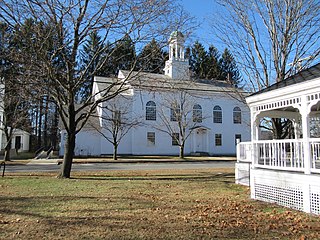Related Research Articles

Walpole is a town in Cheshire County, New Hampshire, United States. The population was 3,633 at the 2020 census.
This article contains information about the literary events and publications of 1888.
Louisa may refer to:
Beale is an English surname. At the time of the British Census of 1881, its relative frequency was highest in Dorset, followed by Huntingdonshire, Hampshire, Sussex, Oxfordshire, Wiltshire, Warwickshire, Kent and Surrey.
Stevenson is an English language patronymic surname meaning "son of Steven". Its first historical record is from pre-10th-century England. Another origin of the name is as a toponymic surname related to the place Stevenstone in Devon, England. There are variant spellings of the name, including Stephenson.
Lehmann is a German surname.
Bibb is a surname of English origin. At the time of the British Census of 1881, its relative frequency was highest in Warwickshire, followed by Worcestershire, Staffordshire, Dunbartonshire, London and Northamptonshire. In all other British counties, its relative frequency was below national average. The name Bibb may refer to:
Booth is a surname of northern English and Scottish origin, but arguably of pre 7th century Norse-Viking origins. It is or rather was, topographical, and described a person who lived in a small barn or bothy. Derived from the word "both", the word was used to denote various kinds of shelter, but especially a herdsman's dwelling on a summer pasture. The surname is most popular in Northern England, where early Scandinavian influence was marked, and to some extent in Scotland.
Burroughs is a surname of French origin. At the time of the British Census of 1881, its relative frequency was highest in Suffolk, followed by Norfolk, Gloucestershire, Shropshire, Huntingdonshire, Somerset, Hampshire, Surrey, Lincolnshire, and Orkney.
Pike is a surname of English origin.
Blackburn is a surname of English origin. At the time of the British Census of 1881, its frequency was highest in Yorkshire, followed by Cumberland, Lancashire, Lincolnshire, Northumberland, County Durham and Norfolk. In all other British counties, its frequency was below national average. Notable people with the surname include:
Adey is a surname of English origin. At the time of the British Census of 1881, its relative frequency was highest in Berkshire, followed by Staffordshire, Wiltshire, Cardiganshire, Hampshire, Warwickshire, the Channel Islands, Dorset, County Durham and Gloucestershire. Notable people with the surname include:
Upton is a surname of English origin and a rarely used given name. At the time of the British Census of 1881 Upton Surname at Forebears, the frequency of the surname Upton was highest in Sussex, followed by Oxfordshire, Leicestershire, Staffordshire, Nottinghamshire, Warwickshire, Kent, Bedfordshire and Derbyshire. The name Upton is a variation of Upperton and is derived from the Old English for Upper Ton, Upper Enclosure or Upper Field.
Rosso is a surname of Italian origin, which means "red (haired)".
Todhunter is a surname of English origin. At the time of the British Census of 1881 Todhunter Surname at Forebears, its relative frequency was highest in Cumberland, followed by the Isle of Man, Huntingdonshire, Cambridgeshire, Cheshire, Northumberland, Lancashire, Surrey, Essex, and County Durham.
Bloodsworth is a surname of English origin. At the time of the British Census of 1881, its relative frequency was highest in Nottinghamshire, followed by Lancashire, Derbyshire, Surrey, County Durham and London. In all other British counties, its relative frequency was below national average. The name Bloodsworth may refer to:
Boocock is a surname of English origin. At the time of the British Census of 1881, its frequency was highest in Yorkshire, followed by Lancashire and Northumberland. In all other British counties its frequency was below national average. The name Boocock may refer to:
March is a surname. Notable people with the surname include:
Amos is both a given name and a surname made popular by the Hebrew Bible/Old Testament prophet. It may refer to:
Farwell is a surname of English origin. At the time of the British Census of 1881, its relative frequency was highest in Dorset, followed by Buteshire, Hampshire, Somerset, Surrey, Worcestershire, Cheshire, London and Northumberland. Notable people with the surname include:
References
- ↑ "Alcott Distribution". forebears.co.uk. Retrieved 25 January 2014